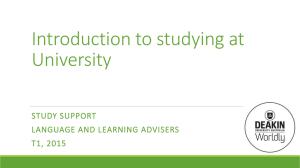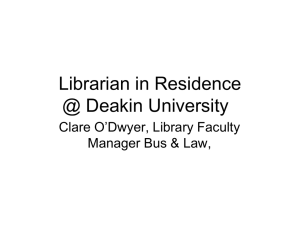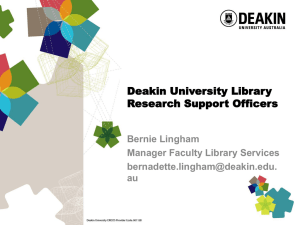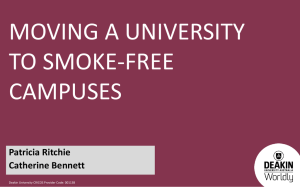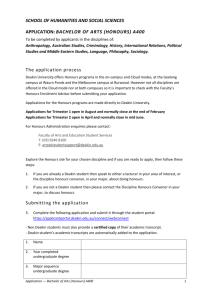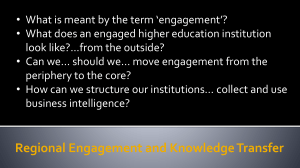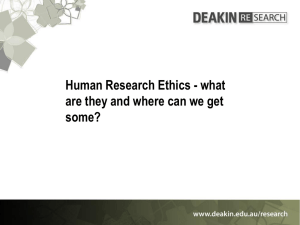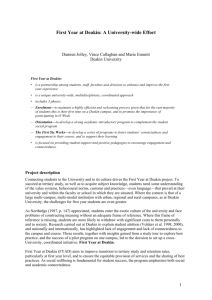Academic capitalism and the globalisation of the political economy
advertisement
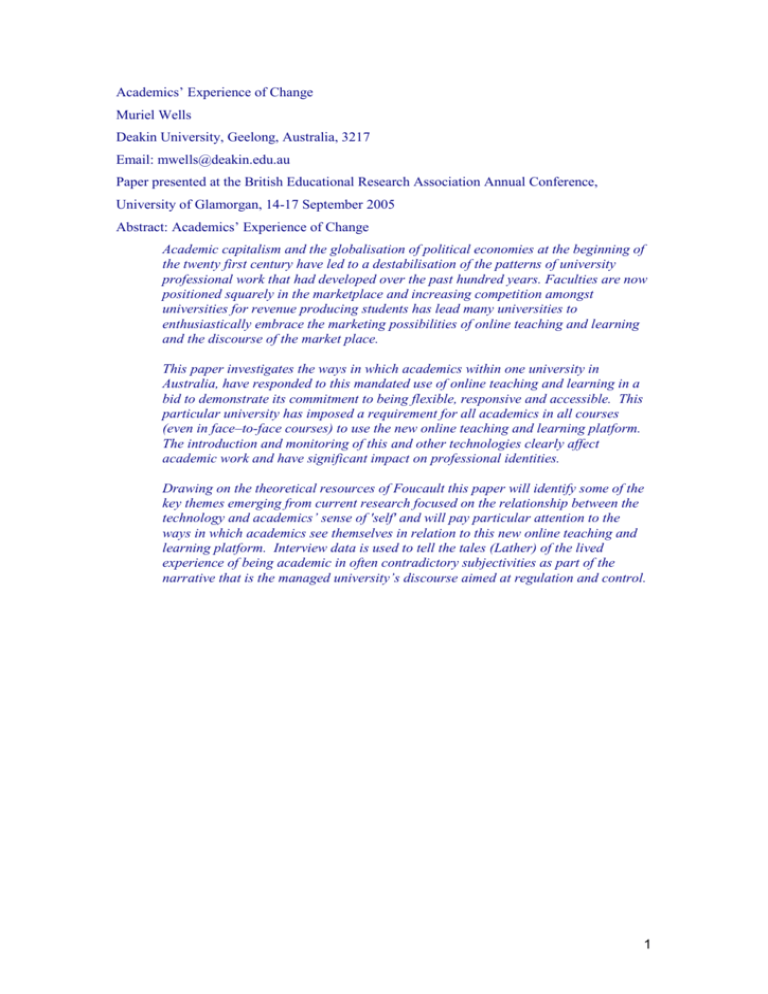
Academics’ Experience of Change Muriel Wells Deakin University, Geelong, Australia, 3217 Email: mwells@deakin.edu.au Paper presented at the British Educational Research Association Annual Conference, University of Glamorgan, 14-17 September 2005 Abstract: Academics’ Experience of Change Academic capitalism and the globalisation of political economies at the beginning of the twenty first century have led to a destabilisation of the patterns of university professional work that had developed over the past hundred years. Faculties are now positioned squarely in the marketplace and increasing competition amongst universities for revenue producing students has lead many universities to enthusiastically embrace the marketing possibilities of online teaching and learning and the discourse of the market place. This paper investigates the ways in which academics within one university in Australia, have responded to this mandated use of online teaching and learning in a bid to demonstrate its commitment to being flexible, responsive and accessible. This particular university has imposed a requirement for all academics in all courses (even in face–to-face courses) to use the new online teaching and learning platform. The introduction and monitoring of this and other technologies clearly affect academic work and have significant impact on professional identities. Drawing on the theoretical resources of Foucault this paper will identify some of the key themes emerging from current research focused on the relationship between the technology and academics’ sense of 'self' and will pay particular attention to the ways in which academics see themselves in relation to this new online teaching and learning platform. Interview data is used to tell the tales (Lather) of the lived experience of being academic in often contradictory subjectivities as part of the narrative that is the managed university’s discourse aimed at regulation and control. 1 S. Pierre (2004) notes that Deleuze’s 1990 premonition of education turning into business has today become a reality. St. Pierre reminds us of the fragility of a subject situated within the conservatism of oppressive power relations in the educational community. It is specifically because of this fragility that experience of being academic may be affected by large scale imposed change – in this case the imposition of the new online learning environment university-wide. At Deakin University the context for the introduction of new online teaching and learning environments is highly complex and problematic. This paper uses the story of part of my doctoral journey as a participant researcher to explore the experience of change in the field of higher education in a university setting in Australia, for my colleagues and for myself. Drawing on the theoretical resources of Foucault I have attempted to draw out some of the key themes emerging from my current research focused on how these academics experience the change as the university administration moves to a system of ever tighter management of teaching and learning. This tale will pay particular attention to the ways in which academics see themselves positioned by the new technologies of the managed university including a Learning Management System (LMS) that masquerades as an online teaching and learning platform. Interview data will be used to create the tales (Lather, 1991 p. 87) of the lived experience of being academic, and the often contradictory subjectivities involved. These lived experiences are influenced by the narrative that is the managed university’s discourse as it attempts to regulate and control the processes of the university and the behaviours (and thoughts?) of its staff, including academics. Telling the Tales Lather (1991) talks about ‘those stories which bring the teller of the tale back into the narrative, embodied, desiring, invested in a variety of often contradictory privileges and struggles’ (Lather, 1991 p. 87). My role within this tale is as the teller who is part of the narrative since I am embodied within the tale, in my role as an academic within the faculty. As part of the university’s push to promote the new technologies of the online learning environment I was invested with the privilege (and consequent struggles) of a one year Online Teaching and Learning Fellowship in 2004 and as such I was positioned as an active promoter of the system, as an agent who embodied the contradiction that exists between workplace realities of teaching and the regulating discourse of the managed university. I was positioned by the move to a new technology that disrupted former pedagogical practices of professional academics. 2 Like Lather I am using a narrative rather than an argumentative rationality. Van Mannen says the latter creates winners and losers while the former works to “illustrate rather than claim” (Van Mannen in Lather, 1988 p. 122). Data have been employed to condense, exemplify, evoke and to embellish theoretical argument (Barthes, quoted in Hutcheon, 1989 p. 91). The data that are used in these tales were collected during interviews with academics from one faculty at the end of the first semester of mandated use of the technologies of what was promoted as a new online Learning Management System (this system used the WebCT Vista platform which was rebadged as Deakin Studies Online (DSO) and was mandated to be used across the whole university in all units, in all courses. The use of tales to tell the stories allows me as the researcher to interpret the data while acknowledging that the so-called facts that one ‘discovers’ are already the product of many levels of interpretation. These facts may already be ‘known’ by someone else so are not necessarily discovered anyway. It is my intention to display some of the complexity of the data of the lived experience of academics. Globalisation and the workplace of the university (the larger setting for this tale) Academic capitalism and the globalisation of political economies at the beginning of the twenty first century have led to a destabilisation of the patterns of university professional work that had developed over the past hundred years. According to Marginson: The processes of transformation and crisis in academic work have four dimensions, which overlap with each other: globalisation and the problem of strategic response to the pressures and opportunities created in a more intensive and extensive international environment; the decline of governmental commitment to, and funding of, higher education; the crisis of values and university identity in an era of corporate reform, the emergence of more professionalised management, and the slippage of collegial ideals and collegial systems of governance; tendencies to the deconstruction of academic professionalism itself. (Marginson, 2000 p. 23) Faculties are now positioned squarely in the marketplace and increasing competition amongst universities for full paying local and international fee paying students has lead many universities to enthusiastically embrace the marketing possibilities of online teaching and learning and the discourse of the market place. 3 Globalisation is political, technological, cultural and economic. It has been ‘influenced above all by developments in systems of communication dating back only to the 1960s’ that have enabled a flow of finance and capital that has no earlier parallel (Giddens, 1999 p. 10). According to Giddens ‘the intensification of worldwide social relations … link distinct localities in such a way that local happenings are shaped by events occurring miles away, and vice versa’ (Giddens, 1990 p. 64). Marginson argues that: The effects of global systems are so powerful that they leak into our other systems and daily practices. .... Large, complex institutions such as universities no longer operate in sealed zones. … Their relationships with other institutions—global, international, national, regional, local—become ‘thicker’, increasingly complex and increasingly determining. … Universities and the individuals in them find it necessary to develop more open, more interactive practices vis-a`-vis people and institutions in other countries, and people and institutions elsewhere in the same country. Universities and their staff become increasingly other-referenced rather than self-referenced. Otherwise they lose ground, and risk slipping off the agenda altogether. (Marginson, 2000 p. 25-26) Restructuring of higher education in Australia has meant that there are limited funds and higher student/academic ratios, increased managerialisation and pressure to create ‘marketable products’. Universities have to take into consideration a changing student profile (work habits, age of students, time poor, more vocationally driven), provide a variety of courses in terms of content, course sizes (some smaller, some larger) and for different purposes (professional development). There are national perspectives to be considered (internationalisation, benchmarks) and government priorities (widening participation, employability of graduates and support for disabled students). There has developed a rhetoric surrounding a commitment to ‘quality learning’ and the need to secure outside research funding. Academic work now includes the management of large and diverse student populations who are now engaging in university studies worldwide and who demand knowledge that is outside the ‘unique, informal culture’ (Ericson, 1997 p. 57) of academics' traditional work. Thus the craft knowledge of academics is being reshaped by administrative interventions that work to change institutional practice. It is not that academic knowledge is being displaced altogether but rather it is being made over as 'professional expertise'. According to Mc William & Taylor (2002) this means an increase in academic performance measures and a need to operate in ‘ways that are approved as technologically innovative’. McWilliam & Taylor also suggest that a key issue is the extent to which this shifts the institutional priority (and thus academic attention) from ‘unique, informal’ relationships with students and peers to formal relationships with the 'expert' information systems through which the performance records of students and peers are compiled (McWilliam & Taylor, 2002). 4 In the knowledge society of today new identities for universities are emerging based on new communication technologies and new conceptions of citizenship. Delanty (2001) argues that universities are interacting with issues such as globalisation, the information age, the nation state, academic capitalism, cultural politics and changing relationships between research and teaching. He notes that globalisation has released universities from the constraints of the nation state but that universities have consequently adopted the corporate culture of industry. ‘Globalisation has pushed universities in the direction of the market’ (Delanty, 2001). The pressure on universities to generate increasingly more revenue and provide increasingly more student places puts them in a situation where they have to serve more than one master. Current changes to the Higher Education funding model in Australia have disrupted the traditional focus of universities. As well as linking with industry and responding to perceived government and community pressures, universities are taking on discursive terms associated with new economics such as knowledge production, innovation and the management of the knowledge economy. That University administrations are under financial pressure in a highly competitive marketplace seems undeniable. Brabazon (2003) argues that ‘For the past five years, money has been poured into online teaching, as a solution’ (Brabazon, 2002 p. xi). Many Australian universities are currently pursuing this option. It is justified, not in terms of reducing costs, but in terms of the needs for students to be technologically literate in an era of high technology use in industry and by the community in general. Blackmore argues that: The other side of this cultural backlash is a structural backlash, mobilised through the corporatisation of higher education, that has shifted the underlying values of a public system towards managerial and market principles. There have been significant changes in modes of governance, and in the patterns of relations between academic staff, their students, their colleagues, their employers and their professions. New forms of educational governance have also changed the focus and nature of equity work. (Blackmore, 2002 p. 246) Globally, universities are increasingly promoting online teaching. This is justified in many ways including the flexibility it provides for students and the access and equity issues it addresses. Some may argue that the increase in online teaching and learning allows universities to exist in a political environment that provides continuously reducing funding to universities while the demand by local students for government supported places is unprecedented. Bigum and Rowan (2004) argue that ‘the enthusiasm of Vice-Chancellors for flexibility in teaching and learning appears to derive from two sources: a perception that 5 flexible delivery is more effective and efficient in terms of getting teaching resources to students and, secondly, that one form of flexible delivery, online teaching, offers possibilities for generating revenue from overseas fee-paying students’ (Bigum & Rowan, 2003 p. 1). Cousins et.al (2004) who conducted a study on the implementation and associated processes of what they call e-learning in higher education institutions across Europe, conclude that a blueprint approach (schematics stages, lessons, phases) does not fully take account of the forces at play within Higher Education institutional cultures and that these forces cannot be mandated or necessarily predicted, such as personalities and personal investment, cultural resistances, failure of technology to deliver at deciding moments, new policy directives and legislation in other areas of higher education (Cousin, 2004). Cousins et al. also ‘recognize that implementation operates in a context of risk and uncertainty in which the future cannot be colonized by prescriptive models.’ A technology driven ‘solution’ to manage online distance students that embraces a student management system, using a learning management system such as DSO (WebCT Vista), and one that possibly limits the forms of pedagogies academics see as available to them may be seen as a disruptive to their positioning as academics. Foucault, Discipline and the Managed University Danaher et. al. (2000) explain that Foucault connects two understandings of discipline (firstly as in the idea of disciplining a disobedient child, and secondly when referring to a body of skills and knowledges) and that he ‘connects these two understandings of discipline through his concept of power-knowledge’ (Dahaner et al., 2000 p. 50). For Foucault ‘one of discipline’s concerns is with producing docile, healthy bodies that can be utilized in work and regulated in terms of time and space’ (Dahaner et al., 2000 p.50) and in this could well be one interpretation of this use of the power relations in this institution. Foucault’s contends that disciplinary power works through sites to quietly coerce people into forms of behaviour and attitudes of mind amenable to the institution. Foucault points out that certain disciplinary procedures, and the panoptic gaze, emerged at an historic moment when it had become necessary to produce a pliable, healthy and sober workforce to service the factories of he Industrial Revolution’ (Dahaner et al., 2000 p. 57) and this is manifested similarly in the way this institution watches over us and monitors our behaviours by the imposition of a variety of new technologies (including the new online learning management system) and other regulatory demands, protocols, procedures, controls and surveillance mechanisms such as ‘the Portal’ that enable them to more readily regulate the behaviours and attitudes as well the work practices of academics. 6 Deakin University (the particular setting for this tale) The restructuring of higher education has led to a new relationship between government and individual institutions. This changing relationship means that institutions are bound to centrally determined policy and funding guidelines by a variety of accountability protocols and procedures; at the same time they are given greater autonomy to determine their own priorities, raise money and fight for custom in the deregulated market place (Henry et al., 1999). As one if its priorities Deakin University is seeking to develop its profile as ‘Australia's most progressive university, internationally recognised for the relevance, innovation and responsiveness of its teaching and learning, research, partnerships and international activities’(Walker, 2004). In terms of distance education Deakin prides itself on using ‘online technologies to enrich learning experiences and add flexibility and value for all students’ (Deakin University, 2004c n.p.). The identity of Deakin as a university in the global market is therefore closely tied to the success of its online learning environment. Deakin University has a long history of involvement in distance education and teaching off campus students in distance education programs has played an important role within the Faculty of Education. The use of online communications is not new to the university but what is different about the use of the DSO learning management system for a new online environment is that it has come with a systemic expectation of usage across the university as well as clear defined requirements for consistency of use and an inbuilt and complex facility for data collection and user management. These shifts are argued by the university executive/management on the basis of both quality assurance, and access and equity for students, as stated in policy documents. Deakin’s web site claims that: Deakin prepares its graduates to be confident and competent using online technologies and in online environments. Deakin uses online technologies to enrich learning experiences and add flexibility and value for all students. Deakin's online campus provides distance education students with additional access to online resources and services and opportunities for interaction (Deakin University, 2004a, Deakin University, 2004c n.p.). The decision taken by Deakin University to impose the use of a new online learning management system on academics could be viewed as part of a push from the Deakin University executive to return Deakin to its former place as a powerful leader in distance education. While online learning had been encouraged in the past, in this top down model the 7 university has now developed more elaborate corporate policies about online learning that explicitly define what each level of ‘onlineness’ requires. In this particular case the university has made it a requirement that all units will have some level of online presence; this includes units that are otherwise taught face to face with undergraduate students. The level of ‘onlineness’ requires included: ‘level of online interaction (basic, extended online, wholly online)’ definitions of which were outlined to academics in the Faculty. (Chee Wah Ong, 2003) Basic Online Each unit offered by Deakin will have: A DSO site established The DSO site will include, where appropriate and where they exist, the Unit Guide, the Study Guide, ‘a response area’ where an electronic version of the Readings (where appropriate) and other resources might be placed, and the opportunity for the teaching staff to communicate with students through a noticeboard (one-many communication eg. Announcements). A facility for structured online interaction between teacher and students will also be available to use at the choice of the lecturers involved in the unit. The Unit Chair must be prepared to report to their unit community through the DSO site established for their unit. This may include complementary use of email in the first instance. Student expectations about communication should be managed (i.e they are told how they should communicate with teaching staff, and how soon they should expect a reply). Extended Online These units will have all of the components of the Basic Online Unit plus: Additional DSO options included in the unit and available for students Additional resources available to students (eg additional electronic content, CD ROMS with additional material, video and audio streaming etc) Additional and/or compulsory use of advanced communication and instruction facilities. More advanced and diverse pedagogies imbedded Wholly Online These units will have all teaching resources and undertake all teaching online including: All content 8 All communication and interaction with students Assignment submission and feedback Each unit will have at least ONE session of interactive communication (Synchronous/asynchronous, or both) between teacher and students online at least weekly or as established at the beginning of the course. Such interactive sessions will have an assessable component where appropriate. Faculties and Schools will determine the extent and form of this type of communication.’ (Email communication, Chee Wah Ong, 2003) Academics were required to inform administrative staff as to the level of ‘onlineness’ that they would use in each unit. This was at a time when many of the staff did not have sufficient knowledge about the system and/or the system components to make such decisions in an informed manner. The term ‘More advanced and diverse pedagogies imbedded’ which was listed in the ‘extended online’ option, does not provide any information to explain what the university might mean by ‘advanced and diverse pedagogies’. Whereas academic practices had in the past been more individualistic with individual units utilising a range of modes of communication and delivery, recent institutional policies have explicitly built in an increasing range of accountabilities. The key requirement for all units in all courses to make use of this online environment at least at the most basic level is one such example. This must be seen in the context of the mission statements of the university to be more relevant and responsive, of being progressive and also offering considerable flexibility on and off campus and Deakin’s published core commitments of ‘access and equity, to rural and regional engagement and to continuing education and life-long learning’(Deakin University, 2003) . The management of Deakin University view the use of online communications and teaching as central to the university’s marketing position. Some describe the experience of online learning as flexible learning. For students who are living and working in times or places that make face to face on campus study difficult or impossible. Online learning may be part of the solution but only if the learning experience is positive, if it meets their needs and/or overcomes other difficulties. But for many academics and students this ‘faceless and placeless’ alongside the issues of dealing with technological actors that may cause high levels of frustration (Wells, 2003) the experience of online learning may not live up to all expectations. The lack of experience in the use of ICTs in general, and online teaching in particular is combined with a lack of opportunity to trial or research effective online pedagogies. 9 The introduction of this new online environment to manage, support and promote the use of online technologies in the teaching and learning process provided an opportunity to identify and analyse the effects on academic staff in the Faculty of Education in terms of their confidence as professional academics and their pedagogical practices, their generalized experience of teaching, and the way their involvement with the new online environment called Deakin Studies Online (DSO) impact on their experience of being academic. There is a declared expectation by the university hierarchy that staff will use the new networked technologies. The commitment of the University to the new technologies is also demonstrated by the fact that they carry out student evaluations which include questions not only about units and lecturers, but also include survey questions about the new online environment. Deakin University Policy Decisions (the paperwork that implicates itself in this tale) Recent policy documents from Deakin University demonstrate a growing commitment to the use of new technologies to teach a growing and more diverse body of students as the need to increase fully funded places is forced on universities by what they see as a requirement to increase funds to offset the dwindling supply of Commonwealth Government funding. The Vice Chancellor’s welcome message on the University web site is available in English, Chinese, Indonesian, Arabic and Spanish. The university’s campus mission statement (Deakin University, 2003) includes mention of ‘The Centre for Knowledge Technologies and Online Learning’. The Burwood campus is said to include the ‘Centre for Innovative Teaching and Learning which will house the Education Faculty’. The term ‘Innovative’ is not defined but it seems reasonable to see a strong link to online teaching and learning given that point 1.4 in the University’s Operational plan states the need to ‘Promoting Innovation through Online Teaching and Learning’ (Deakin University, 2004b). As well as this in section 4 ‘Recruiting and Retaining Staff’, point 4.2 of this operational plan states the expectation that the university will: Review the induction and orientation program by the end of April, with an emphasis on developing online material where appropriate and ensuring that all new staff undertake an appropriate induction and orientation program. (Deakin University, 2004b, p. 5) In this way the university is demonstrating a clear commitment to online learning regardless of the views of its academic staff. 10 The Deakin web site which is about Online and off-campus learning says that ‘Deakin prepares its graduates to be confident and competent using online technologies and in online environments; Deakin uses online technologies to enrich learning experiences and add flexibility and value for all students and that Deakin's online campus provides distance education students with additional access to online resources and services and opportunities for interaction. The text of an audio stream on one of Deakin’s web pages says that: Deakin University has invested heavily in online and off-campus learning. All students at Deakin have access to a world class set of tools for accessing online education. Deakin University’s reputation in the field of distance education has been built up over many years. Deakin has won national awards for its innovative use of learning technologies and is widely recognized for the quality of its teaching materials. All under graduate students at Deakin take at least one online unit as part of their course. This ensures that all Deakin graduates will have the skill-set they need to participate successfully in a world where so much business and community interaction is conducted online. (Deakin University, 2004d). Deakin prides itself on having ‘More than 40 percent of Deakin students study by distance education’. Advertising says that online developments, including the implementation of a new gateway, portal and enterprise learning management system, are led and coordinated by the Office of the Pro Vice-Chancellor (Online Services). This role, which was established in 2002, includes responsibility for the integration of systems that support Deakin's commitment to online support for teaching and learning. The appointment of a Pro Vice-Chancellor (Online Services) is a particularly powerful demonstration of Deakin’s commitment to innovation and the use of new technologies and online learning. Deakin University 2003 campus vision statements explain that are intended to be ‘aspirational statements, designed to guide further development and planning’ that provide ‘some idea about what we hope to have achieved in the next five or so years’ (Deakin University, 2003). The vision for the Geelong campus describes how that ‘campus will house the Centre for Knowledge Technologies and Online Learning which will focus research in this area, housing the first CRC to be led by the University, and providing a hub for Deakin’s extensive national and international online and distance education programs’. The Burwood campus vision describes how that campus will have ‘outstanding research and teaching facilities including the Centre for Innovative Teaching and Learning which will house the Education Faculty and provide state-of-the-art general purpose teaching facilities’ (Deakin University, 2003).The university is operating in a political climate where university administrations are increasingly 11 putting pressure on faculty to participate in distance learning and other technology related endeavours. Deakin University has been a leader in the provision of distance education and such has been at the forefront of a number of waves of change in the development of distance education resources and pedagogy. Deakin’s current policy decisions and statements demonstrate and articulate their commitment to be part of the knowledge economy. Their campus statements include mention of their ‘learning partners’ and ‘commercial activities’ (Deakin University, 2003). The language of the University website devoted to representing the Vice Chancellor, Sally Walker is a tribute to commercial enterprise. This language includes headings such as ‘Two wins in 12 days for Deakin's million dollar researcher’; ‘New venture to revolutionise the Australian fish-farming industry’ and ‘Masterplan sets path for Deakin at Burwood’ (Deakin University, 2003). The participants/academics (the characters in the tale) This section looks at the ways in which academics in this Faculty of Education, have responded to the mandated use of online teaching and learning that is part of the university’s bid to demonstrate its commitment to being flexible, responsive and accessible. Being a Faculty of Education, the staff has a stake in, and well developed attitudes and values about effective teaching and learning and Geelong campus in particular had a long history of innovation in off campus teaching. The focus of their work is ‘education’ and ‘teaching’, their research is carried out on issues to do with ‘education’ and ‘teaching’. I am a relatively new academic in the Faculty of Education having joined the Faculty three years ago. Given the focus of the work of academics in this faculty is education is was thought that changes in the teaching aspect of academic work would be particularly important to members of this faculty. Bower (2001) study found that academics in a higher educational institute in the US “resist[ed] efforts to force them into distance learning [though not necessarily computer mediated learning]. They resist[ed] individually or as a whole, often seeking the guidance of union representatives” (p. 1). While individual faculty members may have individual reasons to resist participating in the latest wave of distance education, there are several reasons why faculty in general resist distance education. In Bower’s study it was found that resistance to distance education was specifically expressed in concern for the adequacy of institutional support, the change in interpersonal relations, and quality. Bower argues that ‘Faculty are 12 exhibiting healthy skepticism when they resist the call to jump on the latest educational bandwagon before assessing how this new technology will help students learn’ (Bower, 2001 n.p.). Resistance to the corporatisation of the work of academics can be seen in the work of Zeegers (2002) who found that academics at Deakin University questioned moves ‘into corporate discourses of the University executive while they themselves have maintained a pedagogical stance that does not admit of such practices’ (p. 94). Blackmore (1997) has described how the ‘corporatisation of school education produced new corporate work identities and new modes of work behaviour’ (n.p.). This description has much in common with the experience of the higher education sector where ‘New learning technologies facilitate the commodification of curriculum into consumable ‘packages’ online and off-campus’ and where these factors have collectively produced a significant shift in the nature of the work for academics as there is a move toward ‘academic capitalism (Blackmore, 2001). The tales The tales have been created from my interview data. They are not direct quotes. I have used the words and ideas of my interviewees to construct my tales. They are not profiles of specific academics. Angelina’s Tale This tale is of the highly experienced and techno savvy academic that tells us about some of the sad and perplexing moments but also includes an enlightening moment of her experience in online teaching using DSO, the new Learning Management System. Angelina: I want to engage my mature age students with ideas, to give them confidence and the skills to find the information they need in a supportive environment I have established so that their ideas are accepted, that diversity is valued … in which I’ve set up a culture that allows principles of effective teaching to grow and mature. I care about my students’ learning. I think it is important to be willing to learn from your students, to put your ego to the back, to give them confidence. I want to facilitate a group process, where students are listening to others’ ideas and where my belief in collaborative ideals can be realised because the group brings out much better perspectives for an idea, not my construction. I want them to engage and link to their experience ... I facilitate … I prepare the curriculum design .. but I want them to be active learners .. they’re adult learners .. I want them to think it’s okay to be critical .. to think for themselves .. it isn’t always something that is valued in their workplace ..” In this way Angelina gives us an insight into her desires and ideals for her teaching practice. Angelina is a highly experienced teacher in the university. She is well known and highly respected by her peers for her expertise in the use of computers and online technologies in her teaching. She has previously used a different online conferencing system to facilitate online discussions with her students. 13 Angelina talks about the new system and how she felt when it was imposed on her. I was initially keen to be involved with the new technologies. But I found I was really offended by it. It is so structured. I found I was losing my teacher presence.I was confident last year. I tried to take the whole lot of what I did in FirstClass (the previous conferencing system) straight into DSO – I deliberately did that. I wanted to see if it would work. But it was so standardised .. driven by regulation rather than good pedagogy and assessment practices. I really wonder if the people who designed it and who manage the implementation, IT people, have any idea about what good pedagogy and good assessment practices look like. Angelina also talks about issues related to online teaching that she did not necessarily see as consequence of using DSO. Online teaching is not valued, not like time teaching face to face; that is respected .. but not online., yet is takes lots of time setting up resources. And its staged teaching .. different times that mature students are available to learn and therefore need your support,… .. if they’re teachers then many want to do this work in the school holidays .. not weekly as you might expect or would happen on campus. Then you have to help students navigate the resources …. and you have the time lag even in your own memory of what resources you have prepared …. Have to reread and remake courses. (She comes back to her loss of professional identity again) … and sometimes they forget who the tutor is and you don’t always get the respect … if they don’t know I’m the tutor .. and this is not always clear online. And I try to be flexible .. but many want structure .. so there is a challenge between structure and flexibility .. some even want to know how many words do you have to write online? .. they wouldn’t ask this in a face to face tutorial .. how many words would you speak in a tutorial? .. so you can be dealing with angst ridden students .. Even so Angelina found a positive aspect of this change but this also reminded her of the negative feelings she experienced. That was one of the things .. my take on the positive ..I had forgotten .. it reminded me that a lot of people go through this and I hadn’t gone through it for a long time and it was really quite a bit of an identity crisis and I had been really confident and I lost a lot of that confidence because of the tool .. and so it was a good experience to try to master it again although I don’t know if anyone can master it but at least work out strategies .. it did threaten my confidence. Angelina demonstrates a number of issues here including a loss of ‘teacher presence’ as she calls it, in her relationship with her students, the challenges of online teaching combined with a lack of valuing of online teaching by her peers and those in leadership roles, as well as challenges to what she believes to be effective pedagogical practices. Angelina finds herself positioned as ‘less than’, she talks about a loss of confidence and of an identity crisis. Her experience of ‘being academic’ was diminished, at least for a period of time. Angelina’s tale gives us a glimpse of how academics are positioned as ‘less than’ they might otherwise be in more traditional forms of academic teaching. 14 Jonathan’s Tale Jonathan is a highly experienced academic with many years of teaching in the university. His teaching work at this time is mainly with on campus students in a face to face mode. He is very confident with his course materials and with his delivery in this mode. Here is his response to changes across time in the university and to the university requirement to use DSO in all on campus units in all courses. My time at the university has been characterised by change – work location, inking gestetner – wax sheets on drums, photocopies, typewriters to computers, have to have a set for diversity, respond to these things. More change, MAC pluses .. excitement when someone learned how to cut and paste - it is now more portable, more flexible, maybe more productive, makes life easier here. Even though there is a mandated requirement some people have managed to totally ignore the online system – changed the focus away from the technology because we all know that what goes around comes around. Some people are uncomfortable with all this new stuff, some might be resistant .. I’m more optimistic. The computer replaces your filing cabinet. Every year I’ve generated new materials but I still use overhead projectors. I have become very disturbed by PowerPoints as a mode of lecturing. They structure the lecture. I never use the PowerPoints as a representation of knowledge … nothing dynamic about them – they go up and the lecturer reads from the PowerPoint – and kids have printouts .. a waste of time … learn more about the optimum way of depicting the understanding from our lectures using technology. I teach face to face .. young students just out of school … and its particularly important that they have social interaction otherwise they can be disconnected. They need to build bridges to the educational community – share experiences with other students. Jonathan gives us some insight into his thoughts about being academic in a general way and his concerns about the use of new technologies in academic teaching. Now he starts to talk about DSO in particular. The arguments go on for ever .. new technology and old technology; DSO and school based practice, practicum and field based apprenticeship models. The impact of university limited training compared to the impact of schools. When you increase online time and reduce face to face teaching then there are repercussions for the students. The interaction of oldest technology, teaching with the newest technology, online, how do you get the best out of all this for the student teachers? And it depends how relevant and suitable the online materials are. But if you want to develop great teachers then the online technology stuff is just another nuisance the university has created to make life difficult for us and to supposedly save them money .. but I think it actually costs them much more in purchase of the technology and the payment of staff to make the technology run effectively .. money that could be better spent on increasing the numbers of teaching staff instead of this continual increase in the number of non-academic staff in the university. 15 I think lots of people who do all their teaching on campus, in face to face programs, will just ignore the requirements of DSO. Someone in the faculty, an admin person probably, will put up the unit guide and that will meet the requirements but we won’t use it to teach. It can’t really teach anyway. I don’t want to know how to put up stuff myself. I can give the students anything I want them to have. DSO doesn’t have anything to offer these young people just out of school. Jonathan’s questions the use of DSO “The interaction of oldest technology, teaching with the newest technology, online, how do you get the best out of all this for the student teachers?’. He can identify this as an issue but does not provide any possible solutions. Jonathan is expressing concerns about constant change and what he sees as an incongruous demand for DSO to be integrated into on campus face to face programs and the possible reasons why the university is making this imposition. His words also indicate possible resistance strategies to administrative interventions that are attempting to reshape his craft knowledge; strategies that are available to academics who teach in on campus programs – ignoring DSO and the university’s demand for it to be used, or identifying strategies that allow him to bypass it. The discourse Jonathon engages in can be seen as producing resistance technologies to position DSO in a negative way that sits more comfortably with his view of effective pedagogy in a manner referred to by Foucault’s concept of power relations producing resistance to themselves. Jonathans words could also be viewed through Giddens’ (1991) notion of a ‘protective cocoon’ that we use to filter out any threats to our identity (including our professional identity), and to ensure ‘ontological security’. Jonathan does not articulate how he will deal with the university’s regulatory demand to have at lease one wholly online unit in every course, including on campus courses which for this faculty means that throughout the four years for the undergraduate course, or two years for the post graduate course, one unit has to be taught ‘wholly online’; a reality Jonathan has yet to face. Jonathon also mentions a further issue that of the redirection of resources away from the professional work in the form of academic salaries and into non-academic areas. As Davies points out, “much of the resource base that was previously available to support professional work has been redirected into surveillance and auditing somehow remains invisible, or at least is generally not spoken about, or subjected to critique” (Davies, 2003). The decisions made by university have lead to new technologies, procedures and protocols that impact on university teaching. DSO in particular is seen by many as a technology that reduces their pedagogical flexibility and their curriculum immediacy. It is seen as a 16 technology that standardises; standardises across courses, across units and across cohorts of students. One academic described it thus: “A technology that does not discriminate between on and off campus students and courses, between young school leavers and mature age remote students and between faculties. One that does not respect the expertise and reputation that the Faculty has built over time, both nationally and internationally around expertise in curriculum, assessment and pedagogy.” Experienced academics speak of disappointment at the impact this enforced change has wrought on their positions as formerly highly respected academics; academics such as Angelina who felt the system lead to a loss of her teacher presence and professional confidence and who was offended by the way she was repositioned by the technology. Even though some academics have developed technologies of resistance to manage their path in this ever changing landscape, they are not necessarily happy, some are even angry, about the imposition of a system that has lead to their perceived need to perform such resistance strategies. The tales foreground the themes of regulation, standardisation and resistance technologies. In mandating the use of DSO, a technology that is designed to standardise in a model that limits the range of pedagogies available, and to mandate it for use in all units, in all courses without taking into consideration the needs of different faculties, the variety of pedagogies used by academics and the needs and desires of the wide variety of students being taught in the university through three campuses, in both urban and rural communities, in Australia and internationally is a rich setting for the development of technologies of resistance. Conclusion Many academics indicated during their interviews that their life as academics have been characterised by change and for many this is just another change that they have to manage. Cousin’s argument seems to be supported by these tales from Deakin in that a blueprint approach does not fully take account of the forces at play; forces that cannot be mandated or necessarily predicted, such as personalities and personal investment and cultural resistances (Cousin et al., 2004). Foucault argues that power relations produce resistance to themselves (Dahaner et al., 2000 p. xiv). This is useful to remember as we conclude this tale of being academic. As the managed university increases the regulatory demands, protocols, procedures, controls and surveillance mechanisms so it produces resistance to itself. This is manifested in the strategies that academics produce as they respond to imposed change and as they perform resistance strategies as a response to being repositioned as ‘less than’. 17 References: Bigum & Rowan 2003, 'Flexible Learning in Teacher Education: myths, muddles and models', Asia Pacific Journal of Teacher Education, vol. Bigum, C. & Rowan, L. 2004, 'Flexible learning in teacher education: myths, muddles and models', Asia-Pacific Journal of Teacher Education, vol. Vol. 32, no. 3, pp. 213-226. Blackmore, J. 1997, Institutional schizophrenia: Self governance, performativity and the self managing school, Australian Association of Research in Education, Brisbane. December 1-4 1997, Brisbane, Blackmore, J. 2001, 'Universities in Crisis? Knowledge Economies, Emancipatory Pedagogies and the Critical Intellectual', Educational Theory, Summer, vol. 51, no. 3, pp. 353. Blackmore, J. 2002, 'Globalisation and the restructuring of higher education for new knowledge economies: new dangers or old habits troubling gender equity work in universities?' Higher Education Quarterly, vol. 56, no. 4, pp. 419-441. Bower, B. L. 2001, 'Distance Education: Facing the Faculty Challenge', Online Journal of Distance Learning Administration, vol. IV, no. II, Summer. Brabazon, T. 2002, Digital Hemlock, University of New South Wale Press Ltd, Sydney, Australia., Sydney, Australia. Chee Wah Ong 2003, Deakin University, Burwood. Cousin, G., Deepwell, F., Land, R. & Ponti, M. Theorising Implementation: Variation and Commonality In European Approaches To E-Learning', <http://www.shef.ac.uk/nlc2004/Proceedings/Symposia/Symposium5/Cousin_ et_al.htm> (July, 2004) Cousin, G. D., F. Land, R. & Ponti, M. Theorising Implementation: Variation and Commonality In European Approaches to E-Learning', <http://www.shef.ac.uk/nlc2004/Proceedings/Symposia/Symposium5/Cousin_ et_al.htm> (June, 2004) Dahaner, G., Schirato, T. & Webb, J. 2000, Understanding Foucault, cultural Studies, Fensham, R., Threadgold, T. & Tulloch, J., Allen & Unwin, St Leonards, NSW, Australia. Davies, B. 2003, 'Death to Critique and Dissent? The Policies and Practices of New Managerialism and of 'Evidence-based Practice'', Gender and Education, vol. 15, no. 1, pp. 91 - 103. Deakin University Campus Vision Statements', <http://www.deakin.edu.au/vc/docs/Campus_vision_statements_as_approved _by_Council.pdf> (30 August, 2004) Deakin University Deakin University Online and off-campus learning', <http://www.deakin.edu.au/online-offcampus/> Deakin University 2004b, 'Deakin University Operational Plan', vol. Deakin University Online and Off Campus Learning', <http://www.deakin.edu.au/online_offcampus/index.php> Deakin University, A. S. Deakin University Online and off-campus learning', <http://www.deakin.edu.au/online_offcampus/#skipTo> Delanty, G. 2001, Challenging Knowledge: The University in the Knowledge Society, The Society for Research into Higher Education & Open University Press, Buckingham UK. Ericson, R. V. H., K.D 1997, Policing the Risk Society, University of Toronto Press, Toronto. Giddens, A. 1990, The Consequences of Modernity, Polity Press, Cambridge. Giddens, A. 1999, Runaway World: How Globalisation is Reshaping our Lives, Profile Books, London. 18 Henry, M., Lingard, B., Rizv, i. F. & Taylor, S. 1999, 'Working with/against globalization in education', Journal of Education Policy, vol. 14, no. 1, pp. 85 97. Hutcheon, L. 1989, The politics of postmodernism, Routledge, London and New York. Lather, P. 1991, Feminist Research in Education: Within/Against, Deakin University, Geelong. Marginson, S. 2000, 'Rethinking Academic Work in the Global Era', Journal of Higher Education Policy and Management, vol. 22, no. 1, pp. 23-35. McWilliam, E. & Taylor, P. G. 2002, Danger and grieving in the university, Annual Conference of AARE, Brisbane, St. Pierre, E. 2004, 'Deleuzian Concepts for Education: The subject undone', in Semestsky, I. (Ed.) Experiencing Deleuze, Blackwell Publishing, Oxford, UK. Van Maanen, J. 1988, Tales of the Field: On Writing Ethnography, University of Chicago Press, Chicago. Walker, S. Welcome to Deakin University', <http://www.deakin.edu.au/vc/welcome.php> (June, 2004) Wells, M. 2003, Online Teaching: The experience of a 'new' academic, NZAARE, Auckland, Zeegers, M. 2002, A Mercantilist Cinderella: Deakin University and the distance education student in the postmodern world, Thesis, Faculty of Education, Deakin University, Geelong. 19
